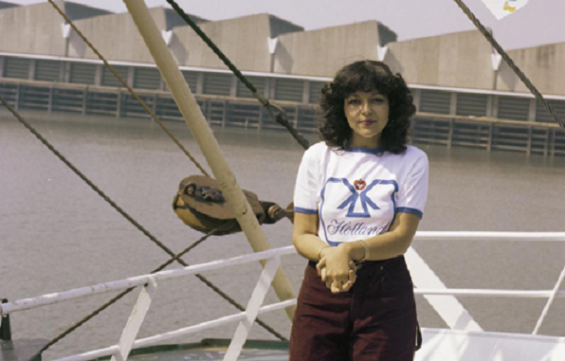In 1980, Morocco was the first African country to send a participant to the Eurovision Song Contest, an international song competition held among the members of the European Broadcasting Union. Singer Samira Bensaid, known by her stage name Samira Said, was chosen by the Moroccan broadcaster Société Nationale de Radiodiffusion et de Télévision (SNRT) to compete under the flag of the Kingdom.
On May 14, in the Netherlands, Said performed alongside the 18 other international competitors. Samira Bensaid’s performance at the Eurovision was a unique experience for the Kingdom. Indeed, Morocco made their debut with a song called Bitakat Hob, Love Card, which was entirely in Arabic.
A love card by Samira Said at the Eurovision
The song written by Moroccan composer Abdalati Amyna, was the first entry to be performed entirely in Arabic in the Eurovision Song Contest. The young singer stood on stage, wearing a blue Kaftan, performing her entry song.
«Morocco's entry, Bitaqat Hub (Love Card), was an unusual one for the Eurovision Song Contest coming at a time when Arabic and Middle Eastern influences, that had later come to be seen in Turkish entries for example, were far from the norm», Eurovision recalled in an article published on its website.
Although it sounded different, Bensaid’s song was meant to convey a message of peace and love. «The message behind the song was that of peace in the midst of the Arab-Israeli tensions», wrote the organizers of the song in competition in a 2012 article entitled «32 years ago today- Morocco's only ever participation».
Unfortunately, the Moroccan diva was unlucky with her song, which received only 7 points, granted by Italy. «Of the 19 countries participating, only the Italian jury were impressed, awarding Morocco their only 7 points of the contest», the same source said.
Abandoning the competition
With her song, Samira Bensaid was ranked 18th, ahead of Finland. Disappointed by the outcome, Morocco preferred to step aside and never participated in the contest again. Eurovision suggested that «Moroccan TV decided that the country should not participate in the contest again».
However, other reasons are believed to be behind this decision. According to Eurovision platform Wiwibloggs, many factors could be challenging for the Kingdom when it comes to the competition. One of these obstacles is the expensive participation fees. «Morocco will undoubtedly struggle to come up with the necessary cash», the same source said.
Although the 1980 edition was the first and last one that saw the participation of a Moroccan singer, in 2019, a French entrant of Moroccan descent is taking part in the international song contest.
In fact, the 2019 edition, hosted by Israel, will see the participation of Bilal Hassani, a French influencer and singer. The latter is expected to perform «Roi», a song in both Arabic and French.





 chargement...
chargement...













